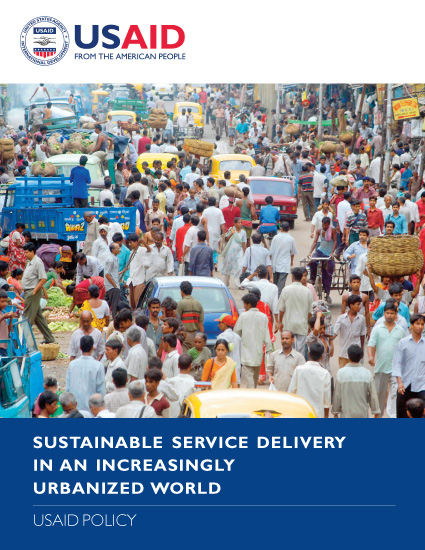Executive Summary
USAID’s Sustainable Urban Services Policy (Policy) provides guidelines to help countries and communities improve the delivery of essential services in urban areas. It emanates from the recognition that unprecedented rates of urbanization are reshaping the nature and geography of global poverty, and seeks to harness the rapid growth of cities to achieve our core development objectives.
By 2030, urban areas worldwide will house an additional 1.4 billion people. Nearly all of this growth will take place in the developing world, and every single country in Africa,Asia and Latin America where USAID has a presence will be impacted by urbanization. The National Intelligence Council identified urbanization as a "tectonic shift" that will "affect how the world works" by 2030. The prospects for achieving our core development objectives are, therefore, tied to what happens in these urban areas.
Urbanization in the developing world offers unparalleled promise and opportunity for eradicating extreme poverty, fostering innovation and creativity, and including greater numbers of citizens in increased growth and prosperity than ever before. A unique window of opportunity currently exists to assist governments in building safer and more sustainable cities for the nearly one and a half billion additional people who will reside in cities by 2030.
In addition, the Policy seeks to move away from a development approach oriented around an artificial urban-rural dichotomy. Instead, the Agency believes that development efforts must span a continuum from rural to urban to form an interdependent system. In particular, increasing spatial, economic, and social interconnections between urban and rural areas mean that rural poverty rates tend to fall in countries with higher rates of urbanization. Rural-urban migration, the expansion of periurban areas, and the growth of market towns all offer greater social and economic opportunities for rural residents.
But urbanization also entails a host of major development challenges: one billion people currently live in slums without basic services like clean water; 28 percent of urban under-five children are chronically malnourished; 60 percent of urban dwellers are exposed to natural disasters; some infectious diseases such as tuberculosis (TB), disproportionately affect dense urban populations; and a lack of formal property rights make many vulnerable to forcible evictions, displacement, and lost livelihoods. Compared with men,women in cities face unequal access to work, housing, health, education and representation in urban governance.








Comment
Make a general inquiry or suggest an improvement.